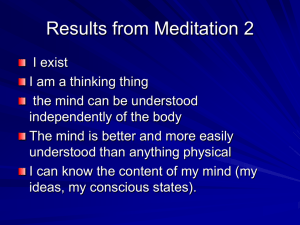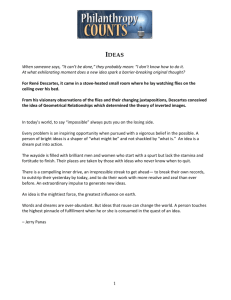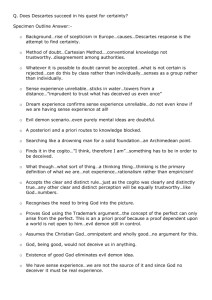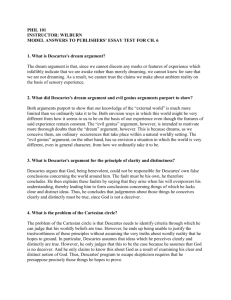GOD, THE DEMON, AND THE
advertisement
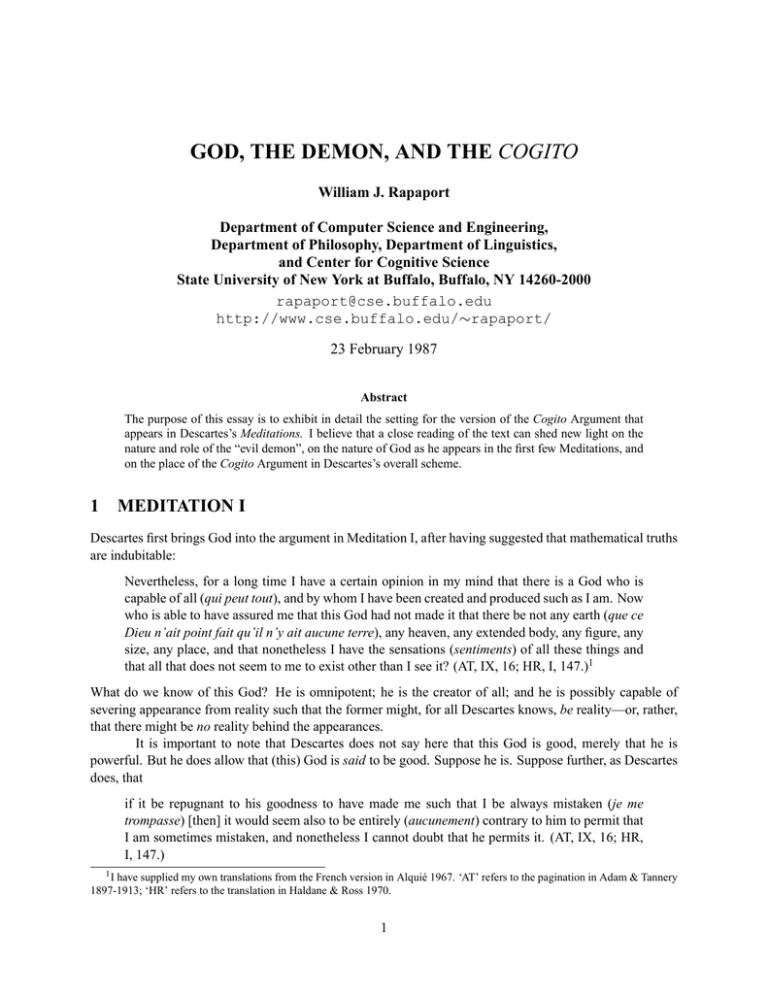
GOD, THE DEMON, AND THE COGITO William J. Rapaport Department of Computer Science and Engineering, Department of Philosophy, Department of Linguistics, and Center for Cognitive Science State University of New York at Buffalo, Buffalo, NY 14260-2000 rapaport@cse.buffalo.edu http://www.cse.buffalo.edu/∼rapaport/ 23 February 1987 Abstract The purpose of this essay is to exhibit in detail the setting for the version of the Cogito Argument that appears in Descartes’s Meditations. I believe that a close reading of the text can shed new light on the nature and role of the “evil demon”, on the nature of God as he appears in the first few Meditations, and on the place of the Cogito Argument in Descartes’s overall scheme. 1 MEDITATION I Descartes first brings God into the argument in Meditation I, after having suggested that mathematical truths are indubitable: Nevertheless, for a long time I have a certain opinion in my mind that there is a God who is capable of all (qui peut tout), and by whom I have been created and produced such as I am. Now who is able to have assured me that this God had not made it that there be not any earth (que ce Dieu n’ait point fait qu’il n’y ait aucune terre), any heaven, any extended body, any figure, any size, any place, and that nonetheless I have the sensations (sentiments) of all these things and that all that does not seem to me to exist other than I see it? (AT, IX, 16; HR, I, 147.)1 What do we know of this God? He is omnipotent; he is the creator of all; and he is possibly capable of severing appearance from reality such that the former might, for all Descartes knows, be reality—or, rather, that there might be no reality behind the appearances. It is important to note that Descartes does not say here that this God is good, merely that he is powerful. But he does allow that (this) God is said to be good. Suppose he is. Suppose further, as Descartes does, that if it be repugnant to his goodness to have made me such that I be always mistaken (je me trompasse) [then] it would seem also to be entirely (aucunement) contrary to him to permit that I am sometimes mistaken, and nonetheless I cannot doubt that he permits it. (AT, IX, 16; HR, I, 147.) 1I have supplied my own translations from the French version in Alquié 1967. ‘AT’ refers to the pagination in Adam & Tannery 1897-1913; ‘HR’ refers to the translation in Haldane & Ross 1970. 1 This conditional is dubious; there might, after all, be something beneficial in being only occasionally mistaken: else how would one be able to distinguish correctness from error? (Cf.: evil might be a necessity in the best possible world in order to enable us to know what good is.) But accepting this conditional for now, Descartes invites us to reason by modus tollens to the conclusion that possibly (this) God is both good and a complete deceiver, or—for there were two assumptions—that he is not good. That is, (this) God might be good and a deceiver, or not good and still a deceiver. In any case, he might be a deceiver. While this is, arguably, the first appearance of the “evil demon”, it is not till some lines later that the mauvais génie is formally announced: I will suppose then that there is, not a true God who is the sovereign source of truth, but a certain mauvais génie, no less cunning and deceitful (trompeur) than powerful, who employed all his industry [or: trickery, industrie] to deceive me (à me tromper). I will think that the heaven, the air, the earth, colors, figures, sounds, and all the external things that we see are only illusions and deceptions (tromperies) which he uses in order to surprise my credulity. I will consider myself as having no hands, no eyes, no flesh, no blood, as not having any sense, but falsely believing to have all these things. (AT, IX, 17-18; HR, I, 148.) What role does this génie play in Meditation I? It is important to see that except for an implicit assumption that deception is evil and except for calling the génie “mauvais”, there is no need for Descartes to insist on the génie’s being evil. All that matters is that he deceives. But not even that, really: What matters is that there might be a génie (a lower-case-g god, if you will) who can make it to be such that there are no external objects corresponding to the “sensations” that Descartes has. Whether this god is evil or not is beside the point. Without the (unnecessary) ascription of evil to the génie, the génie/god is the possibly-deceitful God we previously met. And, with the exception of his possible evilness, he is essentially Berkeley’s God. That is, at the end of Meditation I, Descartes has put forth the hypothesis that Berkeleyan idealism is true. 2 MEDITATION II In Meditation II, Descartes wonders if such a Berkeleyan god exists: A Is there not some God, or some other power, who puts these thoughts in my mind? That is not necessary . . . . (AT, IX, 19; HR, I, 150.) It is important for what follows to see that Descartes does not assume, even pro tempore as part of his methodology of doubt, that such a God or power (e.g., génie) exists, nor does he deny it: It is contingent. The génie/god might or might not exist: Either hypothesis is tenable, and Descartes works with both assumptions. We have now reached the point at which the setting of the Cogito Argument can be exhibited. Here is the famous—and crucial—passage: B THAT IS NOT NECESSARY; FOR PERHAPS I AM CAPABLE OF PRODUCING THEM MYSELF. Me, then, at least am I not something? But I have already denied that I had any sense or any body. I hesitate nonetheless, for what follows from that? I could not be without them? BUT I WAS PERSUADED THAT THERE WAS NOTHING IN ALL THE WORLD, that there wasn’t any heaven, any earth, any minds, nor any bodies; WAS I NOT ALSO PERSUADED THAT I WAS NOT? CERTAINLY NOT; I WAS WITHOUT DOUBT (j’étais sans doute), IF I WAS PERSUADED OR ONLY IF I THOUGHT SOMETHING. 2 C But there is some very powerful and very cunning deceiver (trompeur), who uses all his industry to deceive me always. There is then no doubt that I am, if he deceives me; and though he deceive me as much as he would wish, he would never know how to make it that I be nothing (il ne saurait jamais faire que je ne sois rien), as long as I will think to be something (que je penserai être quelque chose). D So that after having well thought about it and having carefully examined all things, finally it is necessary to conclude and to hold as constant that this proposition (proposition; or: pronouncement (Latin: pronuntiatum, AT, VII, 25)): I am, I exist, is necessarily true each time that I pronounce it or that I conceive it in my mind. (AT, IX, 19; HR, I, 150; capitalized emphasis added.) 3 THE STRUCTURE OF THE ARGUMENT What previous commentators do not seem to have noticed is that the argument falls neatly into four parts: A Either a deceiver exists or he doesn’t; B If the deceiver does not exist, then I exist. C If the deceiver does exist, then I exist. D Therefore, I exist. Given the formal validity of [A]–[C]/∴D, the interest clearly lies with [B] and [C]. 3.1 If the Deceiver Does Exist Let us consider [C], first. Suppose there is a deceiver. Suppose he deceives me. “There is then no doubt that I am . . . .” Why? Because ‘deceive’ is a “success” verb; i.e., it is a transitive verb (the referent of) whose direct object must exist if (the referent of) its subject exists: An existent cannot deceive a non-existent. And, ex hypothesi in the present context, the deceiver exists. But Descartes goes on to suggest that if I fail to think I am something, the deceiver could make me nothing. By my analysis, no matter what I am thinking, I exist as long as he deceives me. Why should Descartes suggest that it matters what I think? Because if I were not thinking of myself , then I would not be aware of myself; hence, I would not be aware that, so to speak, there is an “I” to be deceived or to exist. Suppose I am now thinking that 2 + 3 = 5, and suppose that the deceiver is now deceiving me, but that I am not thinking that the deceiver might be deceiving me. Then, while it is the case that I exist (because I am the object of deception), I cannot be aware that that is the case; hence, I cannot know that it is the case. In the context of [C], one does not have to debate whether the cogito is an “inference” or a “performance” or what the meaning of “cogito propositions” are. From the premises that the deceiver exists and deceives me, it follows that I exist and that I think (else in what would the deception consist?). 3.2 If the Deceiver Does Not Exist The well-known difficulties of interpretation of the Cogito Argument make sense only in the context of [B]—a context in which Descartes has us assume that the deceiver does not exist. Suppose the deceiver does not exist. Suppose I think of something. Then I exist: “if I thought of something”, then “I was”.2 2 Contrary to Frankfurt, this does seem to be the cogito, except, of course, for tense (as Frankfurt notes (1966: 332, 334; 1970: 92, 94)). 3 Why? Could it be because ‘thinks’ is also a “success” verb of sorts? That is, could it be because ‘thinks’ is a transitive verb (the referent of) whose subject must exist even if (the referent of) its object doesn’t? (‘Thinks’ is clearly intensional.) Not quite: Hamlet may think of his father, yet Hamlet does not exist.3 One is sorely tempted to beg the question here, and say that existents who think exist. Why, then, can Descartes conclude that ‘I exist’ follows from ‘I think’? Well, I have nothing new to offer on this most celebrated of Cartesian philosophical puzzles,4 although it may be worthwhile to note that, twice later on, Descartes advocates this quasi-success-status of certain verbs: For it may be that that which I see is not, indeed, wax; . . . but it may not be that when I see, or (which I no longer distinguish) when I think to see (je pense voir), that I who think be not something. (AT, IX, 26; HR, I, 156.) That is, if I see x, then although x might not exist, I do. And, again, in Meditation IV, For example, examining these past days if something existed in the world, and knowing that from that alone that I examined this question it followed very evidently that I myself existed . . . . (AT, IX, 46f; HR, I, 176.) That is, if I examine whether x exists, then although x might not exist, I do. The point I wish to make about [B] is that it is this portion of the argument—in which, ex hypothesi, the deceiver does not exist—that is the proper locus of the cogito in the Meditations. 3.3 I Exist In [D], Descartes draws the valid conclusion that ‘I exist’ is true, adding: “each time that I pronounce . . . or . . . conceive it”. Suppose I don’t think it (or pronounce or conceive it). Do I cease to exist? Suppose so. Then I think if and only if I exist: cogito is equivalent to sum. What Descartes actually says is: I am, I exist: that is certain; but how long? Namely, as long as I think; for perhaps it might happen, if I ceased to think, that I would cease at the same time to be or to exist. (AT, IX, 21; HR, I, 151-52.) Now, we already know that if I think, then I exist.5 Here we are told that if I don’t think, then it is possible that I don’t exist. Why? Suppose I am not thinking. Then [C] the deceiver (if he exists) cannot be deceiving me; so, possibly, I don’t exist. That is, if I don’t think, then it is possible that I don’t exist. Does ‘I don’t think’ entail ‘I don’t exist’? That is, is it possible (for me) to exist without thinking? While it may be possible,6 I cannot know if it’s ever true, for at those times (if any) that I do exist without thinking, I cannot know anything. 4 MEDITATION III AND BEYOND There is another observation to make concerning the génie/god/deceiver/God. Technically, in Meditation III, Descartes is not proving that God as he is generally conceived exists—at least, not right away: 3 Hamlet deceives his uncle, yet his uncle does not exist; but neither does Hamlet: ‘Deceives’ entails the existence of its object if the subject exists. 4 At least, nothing beyond Rapaport 1976. 5 Actually, this isn’t quite so clear. It may be assumed, as in [B], if the deceiver doesn’t exist. But if he does, ‘I exist’ need not follow from ‘I think’. And in the context of the passage presently under consideration, Descartes is assuming that a deceiver exists. 6 That is, it may be possible in the context of Descartes’s argument; I suppose—or at any rate hope—that it’s highly likely, in fact. 4 But in order to be able to completely remove it [viz., the metaphysical doubt stemming from the operative assumption in [C]], I must examine if there is a god . . . ; and if I find that there be one, I must also examine if he may be a deceiver: for without the knowledge of these two truths, I do not see that I could ever be certain of any thing. (AT, IX, 28-29; HR, I, 159; italics added.) Descartes realizes that he must prove two things: first, whether such a god exists; second, if so, whether he is a deceiver. This is perfectly consistent with the structure of Descartes’s argument in the first two Meditations, as just explicated. The proofs themselves, while interesting, are not of concern here. What is of interest is that in Meditation III, after having proved the existence of God, but not yet having proved God’s non-deceiving nature, Descartes considers “if I myself, who have this idea of God, could be if there were no God” (AT, IX, 38; HR, I, 167). This is of interest, because the existence of God follows logically from Descartes’s (negative) answer to this together with half of the proof of his own existence in Meditation II—although Descartes does not draw the implication. Once more using a version of his favorite argument form—what may be called “exhaustive elimination”—Descartes considers all the possibilities: His own existence comes from either himself, his parents, something else other (= less) than God, or God; but it doesn’t come from the first three; so, if God did not exist, neither would Descartes. That is, (1) If God does not exist, then I do not exist. Now, as we saw, in Meditation II, Descartes claimed that (2) If the génie does not exist, then I do exist. But, as I have been arguing, at this point in the dialectic, for all Descartes knows, the génie is identical to God: We know of God only that he is omnipotent—we do not know yet that he is good and not a deceiver. Nor do we know that the génie is evil—all we (need to) know is that he can deceive. To repeat, at this stage, and continuing to Meditation VI where Descartes finally proves the existence of the external world, the God-of-the-Meditations = Berkeley’s God = the génie. So, (3) God = the génie. Thus, (1) and (2) become: (1.3) If God/the génie does not exist, then I do not exist. (2.3) If God/the génie does not exist, then I do exist. Hence, God/the génie does exist. What is curious about all of this is its relationship to Meditation II. Here, Descartes is arguing that I could not exist if God did not exist. Earlier, he argued by [A]–[D] that I must exist whether or not God or the génie or anything else existed. It is as if Descartes, having ascended the cogito-“ladder”, now jettisons it (cf. Wittgenstein 1921: 6.54). Moreover, since at the end of Meditation III, Descartes argues that God is not a deceiver, the support is knocked away from his Meditation II argument [C] that if god the deceiver exists, then I exist: For if there is no deceiver, then my existence as the object of deception cannot be shown. Curious as this may be, it does, I think, shed light on a yet more curious remark that Descartes makes at the beginning of Meditation IV: [T]here are very few things that one knows with certainty concerning corporeal things, there are many more that are known to us concerning the human mind, and yet many more about God himself . . . . (AT, IX, 42; HR, I, 171.) 5 Yet, the proof of God’s existence in Meditation III depended, presumably, on the Cogito Argument for my existence ([A]–[D]). This should make the latter more certain than the former, not the other way around. To make matters even more puzzling, Descartes stated in Meditation III (as we saw) that [W]ithout the knowledge of these two truths [viz., that God exists and that he is not a deceiver], I do not see that I could ever be certain of any thing. (AT, IX, 29; HR, I, 159.) But isn’t he certain of two (other) things—that he thinks and that he exists—even “without the knowledge of these two truths”? These remarks seem to make a bit more sense if, indeed, Descartes means to throw away the “ladder” of the Cogito Argument as construed above. For that argument in Meditation II can be viewed as providing a “context of discovery” rather than a “context of justification”, to use Popper’s distinction: Nothing can be known with certainty—justified—without (knowledge of) God’s existence and goodness, but neither can anything be known without first discovering one’s own existence. (But I must admit to a lingering suspicion that the entire argument of the Meditations is a rather “by its own bootstraps” operation.)7 References Adam, Charles, & Tannery, Paul (1897–1913) (eds.), Oeuvres de Descartes (Paris: Cerf). Alquié, Ferdinand (1967) (ed.), Descartes: Oeuvres philosophiques, Vol. II (Paris: Garnier). Frankfurt, Harry G. (1966), “Descartes’s Discussion of His Existence in the Second Meditation,” Philosophical Review 75: 329–356. Frankfurt, Harry G. (1970), Demons, Dreamers, and Madmen (Indianapolis: Bobbs-Merrill). Haldane, Elizabeth S., & Ross, G.R.T. (1970), The Philosophical Works of Descartes, Vol. I (Cambridge, UK: Cambridge University Press). Rapaport, William J. (1976), “On Cogito Propositions”, Philosophical Studies 29: 63–68. Wittgenstein, Ludwig (1921), Tractatus Logico-Philosophicus, trans. by D.F. Pears & B.F. McGuinness (New York: Humanities Press, 1972). 7 The research for, and initial writing of, this essay were done while I was in the Department of Philosophy, SUNY Fredonia. I am grateful to Carol Brownson for her insightful comments and discussion of Descartes. 6


